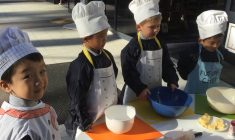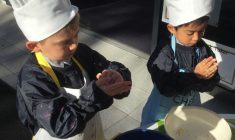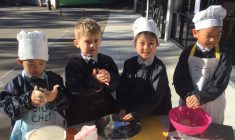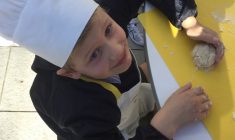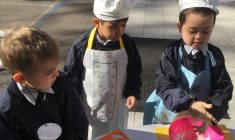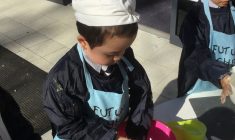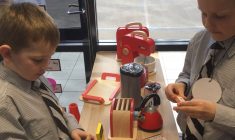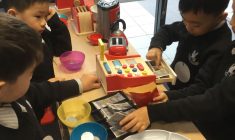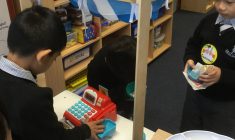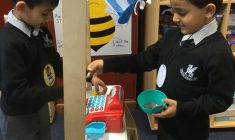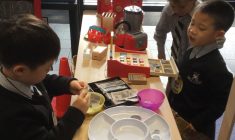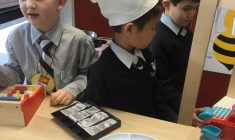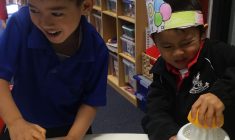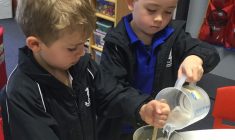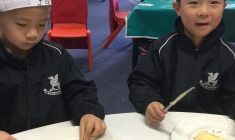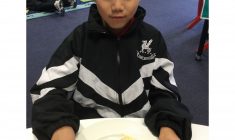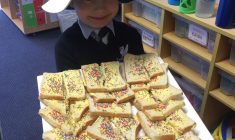A Message from the Head of Lindfield
Technology is a Great Servant but a Terrible Master
During semester break, I attended the International Boys School conference hosted on the Gold Coast. Professor Tim Brailsford who is the current head of Bond University gave a key note speech about Education Success Factors and the Paradox of a Big World Data.
Brailsford talked about the different levels of uptake of technology, especially computer gaming between boy and girls (boys are more voracious gamers) and attributed its impact as one of the reasons for the disparity of university performance between male and female students – females far outperform their male counterparts. This point made me think about the issues of screen time, educational and social development and our boys at Lindfield.
Jean Twenge in her book, iGen (Atria, 2017): Why today’s super-connected kids are growing up less rebellious, more tolerant, less happy – and completely unprepared for adulthood states that the changing profile of young people, which has been trending since 2011 derives from the overuse of technology. Her book surmises that too much screen time makes people more vulnerable, less optimistic, less confident, and less happy.
Researcher Larry Rosen published findings from recent studies into the focus and attention levels of young people and it conveyed some interesting data. As you read through the snapshots below, consider each of them against your own relationship with your smartphone. It was quite revealing.
– University students unlock their phones at least every 15 minutes, look at them for about five minutes each time, and spend a total of 4½ hours a day on their devices.
– Online conversations are an important source of interaction for teens, accounting for much, if not most, of their social lives.
– When teens have their phones taken away, they become highly anxious.
– Phone-related anxiety is closely linked to poor academic performance and sleep deprivation.
– About 80% of teens say they rarely if ever sleep well, usually because they have a smartphone at their bedside and check it before going to sleep and during the night.
– The average adolescent finds it difficult to study for 15 minutes at a time.
– 80%of high-school teachers and 63% of primary school teachers say technology is making students less able to sustain attention.
– Office workers are interrupted (or interrupt themselves) every 3-5 minutes, take as much as 20 minutes to get back to work, and feel stressed by having to work faster to make up for the lost time.
Couple this with the finding from the first large population-based study from the Murdoch Children’s Research Institute to find links between mental health and the amount of time spent gaming and surfing the net.
– A boy playing an average of two hours per day per week is 2.6-times more likely to have conduct and emotional problems
– A boy watching an average of two hours per day per week (or 14 hours each week) is 1.7-times more likely to have hyperactivity/inattention problems.
Rosen has these suggestions for messages that educators and parents should be giving kids:
- Your brain needs an occasional “reset.” Elementary-age children should spend no more than a half hour at a time on a device, followed by a break at least that long. Preteens and adolescents should spend no more than 90 minutes at a time with technology, followed by at least 10-15 minutes on an activity that calms their brain – going outside, exercising, listening to music, meditating, taking a shower, having an in-person conversation with a friend, playing a musical instrument, practicing a foreign language.
- Sleep is vital. Ten hours is the recommended amount for school students, and kids should know that melatonin is naturally secreted in the hours before bedtime to produce sleepiness – unless they’re peering at a blue-light device.
- Tech-free zones and times. These might include the dinner table, restaurant meals, the car and the bedroom.
- Set limits on the amount of screen time allowed. The Australian Guidelines for kids recommends 5-17 year old less than two hours of screen time a day, across all forms.
What are the classroom implications for Newington? Technology in the form of iPads are predominantly used in two ways, as a transformative learning tool and as an engaging reinforcer of teacher-led instruction. iPads enable us to transform your son’s learning, utilising education apps such as Explain Everything, Poplet, imovie and Garage Band. Your son can share, create, conceptualise and express his thinking in ways that are difficult with a pencil and paper. The other use is as an interactive and engaging reinforcer of teacher-led instruction. Reinforcing the foundations in literacy and numeracy, learning which engages and personalises your son’s learning with programs such as Reading Eggs, Spelling City, IXL Maths and Khan Academy.
What about technology use and limits at home? The recommendations are quite clear but it is very hard to make your kids happy in the short term and keep their long-term well-being in mind. Those two goals conflict. Should you just stop access to screens at home? “No,” Twenge says. “The sweet spot for mental health and happiness is having screen time but not using it to excess.”
Screen time for education, finding information, problem solving and creativity is one thing but using it to play Fortnite, look up random YouTube clips, or become enmeshed in social media such as Instagram and Snapchat is altogether a less positive use of technology.
As a parent, in relation to non-educational screen time for our boys, which in my household is most of the time, we need to think about screen time in the same way we think of junk food, it is a sometimes food, which we enjoy but we set limits to how often we indulge.
As parents, you also need to be very aware of how often you disappear into your own phone and the electronic world. None of us like it when our very observant and astute boys call us out for inconsistency or double standards.
“‘Taking Longer to Grow Up’” by Jean Twenge in The Chronicle of Higher Education, November 10, 2017 (Vol. LXIV, #11, p. A7)
“The Distracted Student Mind: Enhancing Its Focus and Attention” by Larry Rosen in Phi Delta Kappan, October 2017 (Vol. 99, #2, p. 8-14)
https://austparents.edu.au/parentech_resources/screentime
https://www.academicpedsjnl.net/article/S1876-2859(16)30555-1/pdf
https://drkristygoodwin.com/updated-screen-time-guidelines-what-parents-really-need-to-know-2/
https://www.esafety.gov.au/education-resources/iparent/kids-online-infographic
Ben Barrington-Higgs









